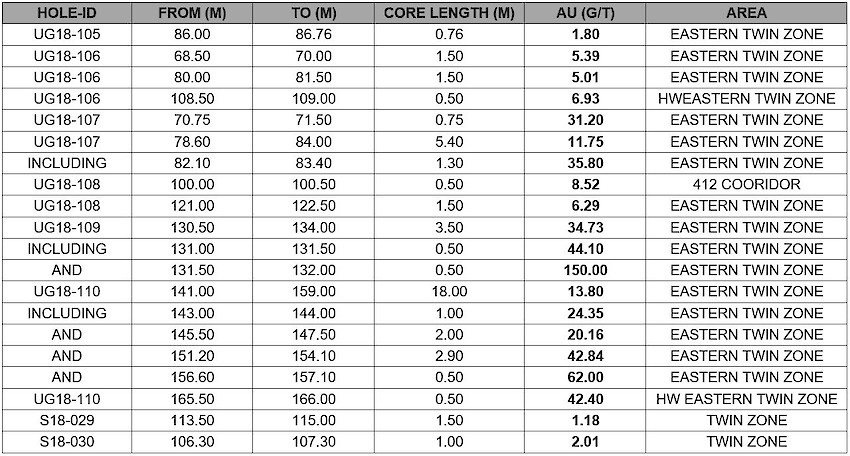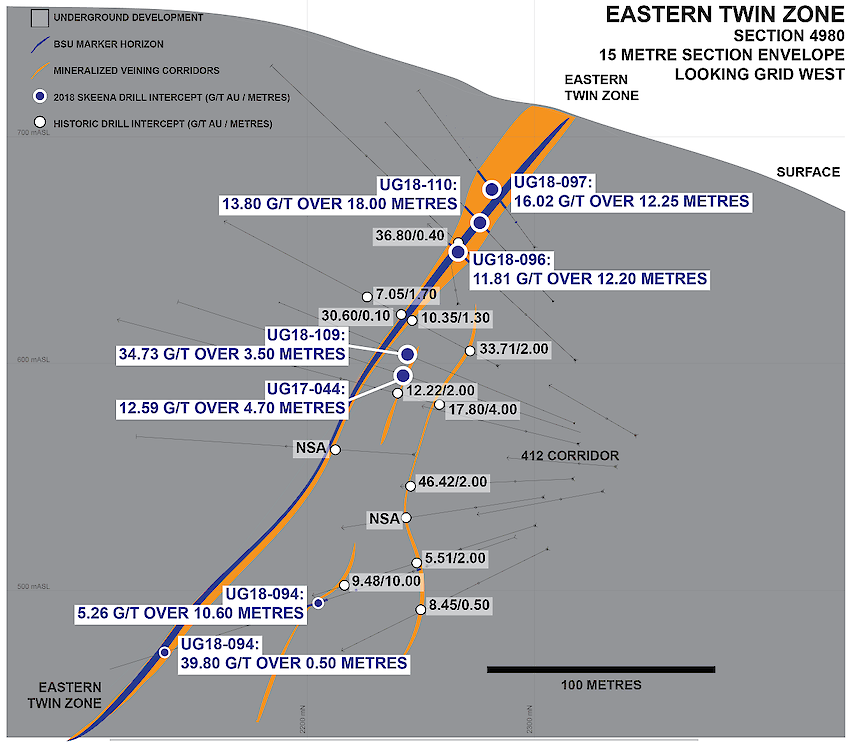Vancouver, BC (August 16, 2018) Skeena Resources Limited (TSX.V: SKE, OTCQX: SKREF) (“Skeena” or the “Company”) is pleased to announce final assay results from the 9,583 m Phase II surface and underground drilling program at the Company’s 100% owned Snip Gold Project (“Snip”) located in the Golden Triangle of British Columbia.
Building upon the data gathered from the Phase I campaign, the Phase II program was designed to expand newly modelled zones via widely spaced exploratory drill step-outs, further delineate known mineralization in areas of low drilling density and validate the historical data in preparation for a maiden resource estimate at Snip. A reference mine section is presented at the end of this release, and on the Company’s website.
Phase II Drilling Highlights:
- 13.80 g/t Au over 18.00 m (UG18-110)
- 34.73 g/t Au over 3.50 m (UG18-109)
- 11.75 g/t Au over 5.40 m (UG18-107)
- 31.20 g/t Au over 0.75 m (UG18-107)
Eastern Twin Zone Demonstrates High-Grade, Continuity and Widths
The recently completed Phase II drilling on the Eastern Twin Zone continues to encounter gold grades and mineralization thicknesses which are significantly above those from historical drilling programs. These results are in part due to a more comprehensive sampling protocol which does not rely on selective sampling but instead samples the entirety of the drillhole. This protocol is intended to provide a complete database to support economic analyses using current gold prices and cut-off grades.
Phase II drillhole UG18-110, which intersected 13.80 g/t Au over 18.00 m including 42.84 g/t Au over 2.90 m in the Eastern Twin Zone, is located on section between previously reported 2018 drillholes UG18-096 and UG18-097 which averaged 11.81 g/t Au over 12.20 m and 16.02 g/t Au over 12.25 m respectively.
The UG18-110 intercept occurs 12 m up-dip of historic drill hole UG-1706 which intercepted 36.80 g/t Au over only 0.40 m from within a selectively sampled interval of 7 m. The inconsistency in zone thickness and gold grade is either related to incomplete historical sampling practices or geological and grade variability within the same mineralized zone of interest, or both.
A further 65 m down-dip of UG18-110, drillhole UG18-109 intersected 34.73 g/t Au over 3.50 m which positively correlates 15 m up-dip with Skeena 2017 drillhole UG17-044 which averaged 12.59 g/t Au over 4.70 m.
“The results from the Eastern Twin Zone are very encouraging as we continue to populate the historical database with modern sampling protocols. Assay results are demonstrating substantially larger widths of mineralization that were left undeveloped due to lower historical metal prices”, commented Paul Geddes, the Company’s Vice President of Exploration. “The respectable grades and widths that we are delineating in the Phase II program should be amenable to underground mining scenarios that historically would have been below the necessary cut-off grade”.
Discussion of Historical Data and Practices
Since mineralization in areas such as the Eastern Twin Zone did not meet the required grade cut-off and mining widths when the mine was in operation, these areas were never drilled at spacings necessary for advancing future resource development and mine planning. Furthermore, the high cut-off grades used during operation meant that drillholes were not sampled in their entirety as only high-grade mineralization was relevant and hence drillholes were selectively assayed.
Prior to the implementation of National Instrument 43-101 standards, reclamation of the mine in 1999 included disposal of all historical drill core, resulting in the inability to fully validate any prior operators’ databases to modern standards. The lack of historic drill core and supporting drilling documentation, paired with the wide spacing of historical drilling in undeveloped areas necessitates that Skeena devote a percentage of its drilling campaign to validate the historical data. This will allow for high confidence underground resources to be reported.
The Company is now compiling all data received from the 2018 Phase II drilling campaign and a summation news release will be released shortly, along with information about future drill plans.
Corporate Update
Skeena is also pleased to announce the closing of the sale of Mount Rainey Silver Inc. and the Porter Idaho project to StrikePoint Gold Inc. (“StrikePoint”), as announced on July 16, 2018. Pursuant to the agreement, StrikePoint acquired all of the issued and outstanding shares of Mount Rainey Silver Inc. from Skeena in exchange for 9,500,000 securities (the “Securities”) and a series of cash payments totalling C$1.5M, secured by a first claim over the issued and outstanding shares of Mount Rainey Silver Inc. The Securities consist of a combination of 7,100,000 common shares in the capital of StrikePoint, and 2,400,000 special warrants, that are convertible to common shares in the capital of StrikePoint for no additional consideration, provided that the conversion will not result in Skeena becoming an insider of StrikePoint. The common shares held by Skeena represent 9.96% of the undiluted issued and outstanding common shares of StrikePoint, and the special warrants represent an additional 3.37% of the undiluted issued and outstanding common shares of StrikePoint. Together the Securities represent 13.33% of the current issued and outstanding StrikePoint common shares, or 12.89% on a partially diluted basis.
About Skeena
Skeena Resources Limited is a junior Canadian mining exploration company focused on developing prospective precious and base metal properties in the Golden Triangle of northwest British Columbia, Canada. The Company’s primary activities are the exploration and development of the past-producing Snip mine and the recently optioned Eskay Creek mine, both acquired from Barrick. In addition, the Company has completed a Preliminary Economic Assessment on the GJ copper-gold porphyry project.
On behalf of the Board of Directors of Skeena Resources Limited,

Walter Coles Jr.
President & CEO
Qualified Persons
Exploration activities at the Snip Gold Project are administered on site by the Company’s Exploration Managers, Colin Russell, P.Geo. and Adrian Newton, P.Geo. In accordance with National Instrument 43-101 Standards of Disclosure for Mineral Projects, Paul Geddes, P.Geo. Vice President Exploration and Resource Development, is the Qualified Person for the Company and has prepared, validated and approved the technical and scientific content of this news release. The Company strictly adheres to CIM Best Practices Guidelines in conducting, documenting, and reporting its exploration activities on its exploration projects.
Quality Assurance – Quality Control
Once received from the drill and processed, all drill core samples are sawn in half, labelled and bagged. The remaining drill core is subsequently securely stored on site. Numbered security tags are applied to lab shipments for chain of custody requirements. The Company inserts quality control (QC) samples at regular intervals in the sample stream, including blanks and reference materials with all sample shipments to monitor laboratory performance. The QAQC program was designed and approved by Lynda Bloom, P.Geo. of Analytical Solutions Ltd., and is overseen by the Company’s Qualified Person, Paul Geddes, P.Geo, Vice President Exploration and Resource Development.
Drill core samples are submitted to ALS Geochemistry’s analytical facility in North Vancouver, British Columbia for preparation and analysis. The ALS facility is accredited to the ISO/IEC 17025 standard for gold assays and all analytical methods include quality control materials at set frequencies with established data acceptance criteria. The entire sample is crushed and 250 grams is pulverized. Analysis for gold is by 50g fire assay fusion with atomic absorption (AAS) finish with a lower limit of 0.01 ppm and upper limit of 100 ppm. Samples with gold assays greater than 10 ppm are re-analyzed using a 1,000g screen metallic fire assay. A selected number of samples are also analyzed using a 48 multi-elemental geochemical package by a 4-acid digestion, followed by Inductively Coupled Plasma Atomic Emission Spectroscopy (ICP-AES) and Inductively Coupled Plasma Mass Spectroscopy (ICP-MS).
Cautionary note regarding forward-looking statements
Certain statements made and information contained herein may constitute “forward looking information” and “forward looking statements” within the meaning of applicable Canadian and United States securities legislation. These statements and information are based on facts currently available to the Company and there is no assurance that actual results will meet management’s expectations. Forward-looking statements and information may be identified by such terms as “anticipates”, “believes”, “targets”, “estimates”, “plans”, “expects”, “may”, “will”, “could” or “would”. Forward-looking statements and information contained herein are based on certain factors and assumptions regarding, among other things, the estimation of mineral resources and reserves, the realization of resource and reserve estimates, metal prices, taxation, the estimation, timing and amount of future exploration and development, capital and operating costs, the availability of financing, the receipt of regulatory approvals, environmental risks, title disputes and other matters. While the Company considers its assumptions to be reasonable as of the date hereof, forward-looking statements and information are not guarantees of future performance and readers should not place undue importance on such statements as actual events and results may differ materially from those described herein. The Company does not undertake to update any forward-looking statements or information except as may be required by applicable securities laws.
Neither TSX Venture Exchange nor the Investment Industry Regulatory Organization of Canada accepts responsibility for the adequacy or accuracy of this release.
Table 1: Snip Project Phase II length weighted drillhole gold composites:
True widths cannot be accurately determined from the information available therefore core lengths are reported. Top cuts have not been applied to high grade assays.
Table 2: Mine grid Phase II drillhole locations and orientations.
Suite 650, 1021 W. Hastings St. Vancouver, B.C., Canada V6E 0C3
Tel: (604) 684-8725 Fax: (604) 558-7695 Email: info@skeenaresources.com


